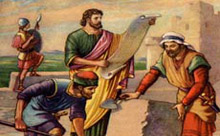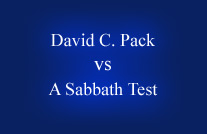

Argument IX
Nehemiah Never Bought It


When advancing his case in defense of dining out on the Sabbath, Dave Pack offers an interesting slant on what Nehemiah meant when he prohibited the Jews of his day from buying and selling on holy time (Neh. 10:31). According to this COG leader, Nehemiah's indictment was only against God's people setting up businesses on the Sabbath as well as spending the entire day purchasing goods and services. Here is how hepresents this phase of his case. We encourage you to consider Mr. Pack’s argument in the context of Nehemiah own words in which he prohibits buying any products regardless of the volume.
And if the people of the land bring ware or any victuals on the Sabbath day to sell, that we would not buy it of them on the Sabbath, or on the holy day: (Neh. 10:31)
David C. Pack:
A growing number of people equate dining out on the Sabbath with ancient Judah buying and selling on the Sabbath. They point to the account of Nehemiah, who confronted and drove off nomadic merchants who sold their foods and wares on the seventh day. They conclude that exchanging money for a restaurant meal during the Sabbath is no different than how the Jews violated the Sabbath in Nehemiah’s day.
Yet, there is a significant difference between these two situations!
Buying from an open-air market during Nehemiah’s time would more accurately be equivalent to shopping at an open farmers market or perhaps a super market today. In a restaurant, one buys a meal that is consumed at that time—which is not the same as shopping for food and taking it home to be eaten later. Dining out at restaurants, as opposed to shopping in volume for the next day’s meals, is comparable to Christ and His disciples gleaning corn to be eaten on the Sabbath, as opposed to gleaning enough for tomorrow’s meals.
Our Response:
Here, Dave Pack contends that what took place in Jerusalem during the days of Nehemiah involved turning the entire Sabbath into a market day and therefore, doesn't apply to God’s Church today. His reasoning implies that Nehemiah would never have a problem with Israel proactively seeking out unbelievers to acquire and prepare their Sabbath meals for them even though Exodus 16 reveals that God excoriated them for doing that very thing themselves. He even declared that any attempt to acquire one’s meals on the Sabbath was an act of defiance against His and His law.
Then said the LORD unto Moses, Behold, I will rain bread from heaven for you; and the people shall go out and gather a certain rate every day, that I may prove them, whether they will walk in my law, or no. And it shall come to pass, that on the sixth day they shall prepare that which they bring in; and it shall be twice as much as they gather daily. (Ex. 16: 4-5)
Later, when some Israelites attempted to acquire their Sabbath meal on the seventh day God expressed His disfavor this way.
And it came to pass, that there went out some of the people on the seventh day for to gather, and they found none. And the LORD said unto Moses, How long refuse you to keep my commandments and my laws? See, for that the LORD hath given you the Sabbath, therefore he gives you on the sixth day the bread of two days; abide ye every man in his place, let no man go out of his place. (Ex. 16: 27-29)
Seeking out a Loophole
In all due respect, what Mr. Pack has attempted to do with this argument would make any criminal defense attorney proud. His strategy is really quite simple. Find a way to prove that it is impossible to obey God in this matter because the scriptures are not specific enough to address his particular situation. This tactic can almost always work if one is creative enough. For example, if the Jews during Nehemiah's day were only eating lunch at a restaurant on the Sabbath, Mr. Pack could argue that the scriptures are silent about going out to breakfast or dinner. After all the Bible only mentions lunch. Or, if people were buying meat on the Sabbath when Nehemiah rebuked them, he could argue that it doesn't say you can't buy vegetables. Or, if they were spending the entire day playing golf he could argue it doesn’t mention spending an hour or two at a driving range.
Adding Clarity to Nehemiah’s Rebuke
At this point it is significant to note that the word “victuals” used in Nehemiah’s rebuke (Neh. 13:15-21 & 10:31), comes from the Hebrew word tsayid. This word means, “game,” “lunch,” or that which is “taken in hunting.” This being the case, Nehemiah was excoriating the Jews for buying FOOD on the Sabbath. Mr. Pack may assert it was great amounts of food, but that is pure speculation, not to mention totally irrelevant. As was just stated: when God first introduced the Israelites to His Sabbath, He specifically prohibited them from acquiring any food on the Sabbath, not to mention preparing it on that day. Furthermore, the Almighty also prohibited His people from going outside their place on the Sabbath for the purpose of obtaining a meal. Today, David C. Pack claims that God's people may do all of these things
Regarding Unbelievers
It is also important to note that those who were selling food on the Sabbath were "non-believers" just like those who work in restaurants today. They were from the city of Tyre.
There dwelt men of Tyre also therein, which brought fish, and all manner of ware, and sold on the Sabbath unto the children of Judah, and in Jerusalem. (Neh. 13:16)
These vendors did not know God. They were totally ignorant of His law and His plan for man. However, this “shortcoming” was irrelevant to Nehemiah. To him, ignorance was no excuse. This truth is born out in the action he would take. He expelled every merchant from the city and warned them in the strongest words possible to NEVER come back on the Sabbath or holy day (Neh. 13:17-20).
A Final Thought
The example of Nehemiah’s uncompromising love of God’s law is a great lesson for all Christians. This champion of faith boldly confronted those who were complicit in causing God’s people to profane His Sabbath. His remedy was forceful and reflected God’s thinking about engaging in commerce on the day He made HOLY. Furthermore, God not only abhorred this practice then, but His opinion on the subject has not changed to this very day.
Despite all the parsing of words, the real point Nehemiah was clearly making in his indictment was that God’s people should NEVER solicit the services of any commercial business on the Sabbath. Any other understanding is simply manipulating the scriptures in an attempt to advance one’s personal preferences.
Next Page
